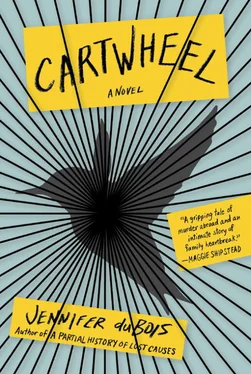And so Eduardo could easily imagine Maria cartwheeling from joy in any number of odd places, and in any number of inappropriate situations, where others might prefer that she not. But it was the joy that was the key; nobody cartwheels when they’re paralyzed with grief. And so Lily’s cartwheel wasn’t damning because it was quirky, as a small but self-righteous vanguard of quirkiness defenders the world over seemed to believe. Lily’s cartwheel was damning because it was, like Lily herself, indifferent. Lily’s cartwheel could not tell you that she was guilty. It could only tell you that—during that interrogation, not twenty hours after her roommate’s death—she had not been sad.
Nevertheless, of course, Eduardo was not sure.
On Tuesday, Eduardo met with Beatriz Carrizo.
“I’m so sorry for what you’ve been through,” he said, pouring her a glass of water.
They were sitting in his office with the shades drawn. Beatriz Carrizo’s hair was heavy and shiny; she wore a stretchy shirt with a pattern of beige-and-red florets. A gold cross glittered between her breasts. “Why can’t my husband be here?” she said.
“I need to interview you separately,” said Eduardo. Beatriz’s eyes widened. “I don’t mean to alarm you. You’re not suspects.” This was true. They’d been away that weekend, at a nephew’s baptism in the north. “But I am interested in hearing your independent impressions of Lily Hayes. Separately.”
Beatriz nodded. “Now.” Eduardo shuffled his papers, to create an aura of shifting gears. “What can you tell me about her?”
Beatriz Carrizo shook her head. “I don’t know,” she said. “I really didn’t know her very long.”
“Just your overall impressions would be helpful.”
Beatriz took a long gulp of water, then stared out the window with a queasy, unresolved expression. “Well,” she said finally. “She was an odd girl, I’ll say that.”
“Odd, how?”
“She was cold. A little deceptive, maybe. She hung around with that boy next door at all hours of the day and night.” Beatriz pursed her lips momentarily as if wanting to stop herself, then unpursed them and went on. “I know she stayed over there when we were out of the house. Also, she was arrogant. She was always telling us things she’d learned about the city, as if we didn’t already know them. It was nice she was interested, I suppose. But it was also so silly. She just didn’t think about other people, that’s all.”
Eduardo nodded. This was his impression, too, though, of course, he would not say so. “And what was Katy like?” he said.
“She was a sweet girl. Quiet. We didn’t know her that well, either. It’s absolutely horrific, what happened to her. Is that your wife?” Beatriz was looking at the picture of Maria on Eduardo’s desk—one of the two framed ones he’d allowed himself to keep. It was taken four years ago, at a beach, and she was doing a handstand. Her hair was whipping around her face and she was smiling, her mouth like a peony. She was the only adult Eduardo had ever known who could do a handstand.
“Yes,” he said, because he always said yes.
“She’s beautiful.”
He looked up at Beatriz quickly. “Did you have any difficulties with Lily?”
“Difficulties?”
“She was obedient? She was respectful? She followed the rules?”
“Difficulties. Well. I suppose there were a few.”
“Yes?”
“Well, I caught her going through our papers.”
“When was this?”
“Maybe two weeks,” said Beatriz. “I mean, maybe two weeks before.”
Eduardo nodded. “And you confronted her?”
“Yes.”
“And how did she react?”
“Well, she was not sorry, I’ll tell you that. She didn’t even pretend to be sorry.”
Eduardo made a note on his pad. “And what else?”
“And then she took that awful job at the club, meeting God knows what sorts of people. She started coming back even later. I’d lie awake waiting to hear her come in. I was so afraid of having to call her parents and say that something had happened to her. Funny, I never worried about anything happening to Katy.” A little fork of wrinkles appeared on Beatriz’s chin. “And then she got fired from her job and lied about it.”
“She did?”
Beatriz nodded and bit her lip. The fork on her chin deepened.
“Do you know why she was fired?” said Eduardo.
“No, but I also can’t imagine why they hired her in the first place. She could barely find the kitchen sink at our house.”
“That’s very helpful,” said Eduardo, making a note on his pad. “Was there anything else?”
Beatriz covered her mouth and nodded.
“What happened?” said Eduardo. Between them, the air felt heavy, salt rimmed; Eduardo could smell the cilantro edge of her sweat, the tang of an insistent perfume. He should not be attracted to her, of course, given his role and hers. What was troubling was that he actually wasn’t.
“She—laughed—at my husband’s depression,” said Beatriz finally.
“She laughed at it?” Eduardo did not blink. His own depression was a thing with claws and teeth and eyes, its own set of tics and preoccupations and prejudices, its own entire integrated personality. The trick to not killing yourself was to convince yourself, every single day, that your departure from the world would have a devastating effect on absolutely everyone around you, despite consistent evidence to the contrary.
“Yes. She’d seen my husband in a state of extreme—depression—” Beatriz looked at her lap. “He was drunk, I mean. And when I spoke to Lily about it, she laughed.”
Eduardo nodded again. “Nervously, perhaps?”
“That was another thing about her. She was never nervous. She was oddly flat. Her—what?”
“Her affect?”
“Right. Her affect was flat.”
Eduardo leaned forward. “This next question I’m going to ask you is not the most important question,” he said. “Even though I’m asking it last.”
“Okay.”
“Did you ever think she could do something like this?”
Beatriz frowned. “Well, no,” she said finally. “I have to say no. I didn’t.”
“Thank you, Señora,” said Eduardo. “This has been very helpful.”
Beatriz looked up, and Eduardo saw that she was tearful. “Should we move?” she said.
“I’m sorry?”
“How long are the police going to need the house?”
Eduardo poured her another glass of water. “You’d want to ask the police about that. Quite a while, I should think.”
“People drive by and honk at all hours of the night. It’s awful. I don’t know how we’re going to live there again.”
“Maybe you can’t.”
“But we’ll never be able to sell it.”
Eduardo pressed his thumb against his glass. “This case is probably going to get quite a bit of attention, you know,” he said. “If Lily Hayes is formally charged. That will help with the sale.”
Beatriz gaped. “You mean, you think someone is going to want to buy the house because of what happened?”
Eduardo looked at her wearily. “I have seen it happen before, Señora.”
Beatriz shook her head. Behind her, the light coming through the window was hemorrhagic. The little gold cross on her chest winked in the sun. “I can’t imagine anyone would be horrible enough to do that,” she said.
And Eduardo told her that, in his professional experience, there was someone horrible enough to do almost anything.
On Friday, the police brought in Lily Hayes’s camera. And finally, Eduardo was sure.
Everything he really needed to know was in the pictures. In the pictures, the ease with which Lily Hayes floated through the universe was ruinously apparent; there simply was not a frisson of friction between her desires and their arrival. Arise, world! she seemed to say. Part, seas! Reveal yourself, Buenos Aires, and let me take your picture! On the camera was a picture of a woman with a blood-colored lesion on her face, clearly taken on the sly. There was a picture of a tiny pantsless boy. There was a picture of Lily Hayes herself, giving an exaggerated thumbs-up as she points to her bug bites. Here, Eduardo saw, was a person without humility. And Eduardo believed that humility, more than anything, was the basis for morality. Goodness begins when the Buberian I/it shifts to the ethically accountable I/thou; it begins with the belief that you do not have a monopoly on consciousness—that you are not, in fact, the only person who exists. And here is Lily Hayes, standing in front of the Basílica Nuestra Señora de Luján, her prodigious bosom spilling out over a too-tight tank top. She is nearly aglow with the light of her narcissism. Does she notice that all the other women are modestly dressed, that their heads are covered? She either does not notice, or she does not care. A person who does not notice is silly. A person who does not care is dangerous. And when Eduardo looked at Lily Hayes’s photos, he could see which kind of person she was. For whatever other qualities she had, Lily Hayes was not unobservant. She noticed everything; the pictures attested to this. Here she is noticing the wings of a dragonfly, and here she is noticing the dew on a guava fruit, and here she is noticing the hilarious discrepancy between an enormous sign advertising COMIDA VEGETARIANA alongside the butchered hide of some unfortunate ungulate, glistening in the sun. What Lily Hayes noticed was gratingly predictable, perhaps, but she did notice. So Eduardo had to conclude—tentatively, of course—that what she didn’t do was care.
Читать дальше












